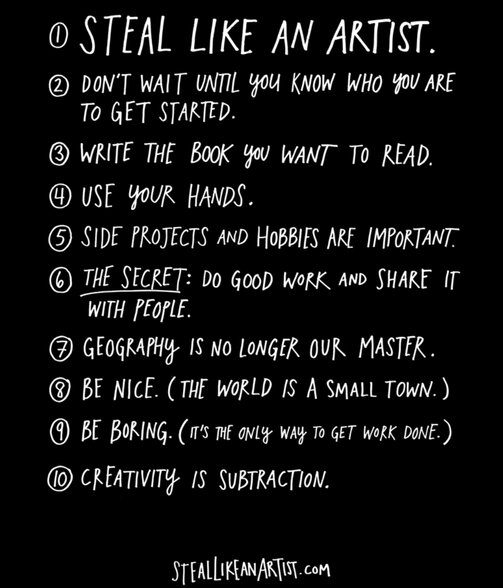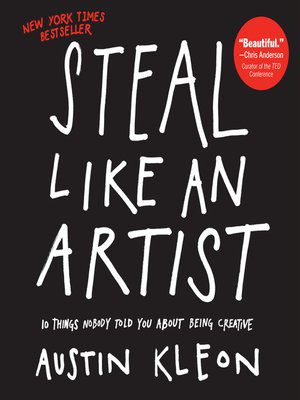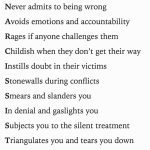Steal Like an Artist: 10 Things Nobody Told You About Being Creative is a manifesto for creativity in the digital age. In 2011, Kleon was asked to address college students in upstate New York, he shaped his speech around the ten things he wished someone had told him when he was starting out.

“Immature poets imitate; mature poets steal; bad poets deface what they take, and good poets make it into something better, or at least something different. The good poet welds his theft into a whole of feeling which is unique, utterly different from that from which it was torn.”—T. S. Eliot”
- Steal like an artist
How does an artist look at the world?
- First, you figure out what’s worth stealing, then you move on to the next thing.
- When you look at the world this way, you stop worrying about what’s “good” and what’s “bad”—there’s only stuff worth stealing, and stuff that’s not worth stealing.
- Everything is up for grabs. If you don’t find something worth stealing today, you might find it worth stealing tomorrow or a month or a year from now.
What a good artist understands is that nothing comes from nowhere. All creative work builds on what came before. Nothing is completely original.
“Every new idea is just a mashup or a remix of one or more previous ideas.”
- Hoarders collect indiscriminately, artists collect selectively. They only collect things that they really love.
- Your job is to collect good ideas. The more good ideas you collect, the more you can choose from to be influenced by.
Swap File
Keep a swipe file. It’s just what it sounds like—a file to keep track of the stuff you’ve swiped from others. It can be digital or analog—it doesn’t matter what form it takes, as long as it works. You can keep a scrapbook and cut and paste things into it, or you can just take pictures of things with your camera phone.
Morgue File
Newspaper reporters call this a “morgue file”. Your morgue file is where you keep the dead things that you’ll later reanimate in your work.
“The only art I’ll ever study is stuff that I can steal from.”—David Bowie
2. Don’t wait until you know who you are to get started
Impostor Sndrome
The clinical definition is a “psychological phenomenon in which people are unable to internalize their accomplishments.” It means that you feel like a phony, like you’re just winging it, that you really don’t have any idea what you’re doing. Guess what: None of us do. Ask anybody doing truly creative work, and they’ll tell you the truth: They don’t know where the good stuff comes from. They just show up to do their thing. Every day.
If you copy from one author, it’s plagiarism, but if you copy from many, it’s research. – Wilson Mizner
All the world’s a stage. Creative work is a kind of theater. The stage is your studio, your desk, or your workstation. The costume is your outfit—your painting pants, your business suit, or that funny hat that helps you think. The props are your materials, your tools, and your medium. The script is just plain old time. An hour here, or an hour there—just time measured out for things to happen.
“Start copying what you love. Copy copy copy copy. At the end of the copy you will find your self.”—Yohji Yamamoto
What to copy is a little bit trickier. Don’t just steal the style, steal the thinking behind the style. You don’t want to look like your heroes, you want to see like your heroes.
At some point, you’ll have to move from imitating your heroes to emulating them. Imitation is about copying. Emulation is when imitation goes one step further, breaking through into your own thing.
A wonderful flaw about human beings is that we’re incapable of making perfect copies. Our failure to copy our heroes is where we discover where our own thing lives. That is how we evolve. So: Copy your heroes. Examine where you fall short. What’s in there that makes you different? That’s what you should amplify and transform into your own work.
In the end, merely imitating your heroes is not flattering them. Transforming their work into something of your own is how you flatter them. Adding something to the world that only you can add.
3 – Write the book you want to read
Go make that stuff.
The manifesto is this: Draw the art you want to see, start the business you want to run, play the music you want to hear, write the books you want to read, build the products you want to use—do the work you want to see done.
4. Use your Hands
Step Away from the screen
You need to find a way to bring your body into your work. Our nerves aren’t a one-way street—our bodies can tell our brains as much as our brains tell our bodies. You know that phrase, “going through the motions”? That’s what’s so great about creative work: If we just start going through the motions, if we strum a guitar, or shuffle sticky notes around a conference table, or start kneading clay, the motion kickstarts our brain into thinking.
The computer is really good for editing your ideas, and it’s really good for getting your ideas ready for publishing out into the world, but it’s not really good for generating ideas. There are too many opportunities to hit the delete key. The computer brings out the uptight perfectionist in us—we start editing ideas before we have them.
“Take time to mess around. Get lost. Wander. You never know where it’s going to lead you.“
5. Side Projects and Hobbies are important
It’s so important to have a hobby. A hobby is something creative that’s just for you. You don’t try to make money or get famous off it, you just do it because it makes you happy. A hobby is something that gives but doesn’t take. While my art is for the world to see, music is only for me and my friends. We get together every Sunday and make noise for a couple of hours. No pressure, no plans. It’s regenerative. It’s like church.
Don’t throw any of yourself away. Don’t worry about a grand scheme or unified vision for your work. Don’t worry about unity—what unifies your work is the fact that you made it. One day, you’ll look back and it will all make sense.
6 – The Secret: Do good work and share it with people
The Not-So-Secret Formula
It’s a two-step process. Step one, “do good work,” is incredibly hard. There are no shortcuts. Make stuff every day. Know you’re going to suck for a while. Fail. Get better. Step two, “share it with people,” was really hard up until about ten years ago or so. Now, it’s very simple: “Put your stuff on the Internet.”
Secret of the Internet
- Step 1: Wonder at something.
- Step 2: Invite others to wonder with you.
You should wonder at the things nobody else is wondering about. If everybody’s wondering about apples, go wonder about oranges. The more open you are about sharing your passions, the closer people will feel to your work. Artists aren’t magicians. There’s no penalty for revealing your secrets.
“Don’t worry about people stealing your ideas. If your ideas are any good, you’ll have to ram them down people’s throats.” —Howard Aiken
7 – Geography is no longer our master
All you need is a little space and a little time—a place to work, and some time to do it; a little self-imposed solitude and temporary captivity. If your living situation doesn’t allow for that, sometimes you can find solitude and captivity in the wild.
“Distance and difference are the secret tonic of creativity. When we get home, home is still the same. But something in our mind has been changed, and that changes everything.”—Jonah Lehrer
Leave Home
Your brain gets too comfortable in your everyday surroundings. You need to make it uncomfortable. You need to spend some time in another land, among people that do things differently than you. Travel makes the world look new, and when the world looks new, our brains work harder.
8. Be Nice (The world is a small town)
If you ever find that you’re the most talented person in the room, you need to find another room.
The trouble with creative work: Sometimes by the time people catch on to what’s valuable about what you do, you’re either a) bored to death with it, or b) dead. You can’t go looking for validation from external sources. Once you put your work into the world, you have no control over the way people will react to it.
Keep a praise file
Life is a lonely business, often filled with discouragement and rejection. Yes, validation is for parking, but it’s still a tremendous boost when people say nice things about our work. Instead of keeping a rejection file, keep a praise file. Use it sparingly—don’t get lost in past glory—but keep it around for when you need the lift.
9. Be Boring (It’s the only way to get work done)
Be regular and orderly in your life, so that you may be violent and original in your work.”—Gustave Flaubert
The worst thing a day job does is take time away from you, but it makes up for that by giving you a daily routine in which you can schedule a regular time for your creative pursuits. Establishing and keeping a routine can be even more important than having a lot of time. Inertia is the death of creativity. You have to stay in the groove. When you get out of the groove, you start to dread the work, because you know it’s going to suck for a while—it’s going to suck until you get back into the flow.
The solution is really simple: Figure out what time you can carve out, what time you can steal, and stick to your routine. Do the work every day, no matter what. No holidays, no sick days. Don’t stop. What you’ll probably find is that the corollary to Parkinson’s Law is usually true: Work gets done in the time available.
10. Creativity is subtraction
It’s often what an artist chooses to leave out that makes the art interesting. What isn’t shown versus what is. It’s the same for people: What makes us interesting isn’t just what we’ve experienced, but also what we haven’t experienced. The same is true when you do your work: You must embrace your limitations and keep moving.
In the end, creativity isn’t just the things we choose to put in, it’s the things we choose to leave out.
All the Best in your quest to get Better. Don’t Settle: Live with Passion.



1 Comment
Pingback: Austin Kleon on Creativity. | Lanre Dahunsi